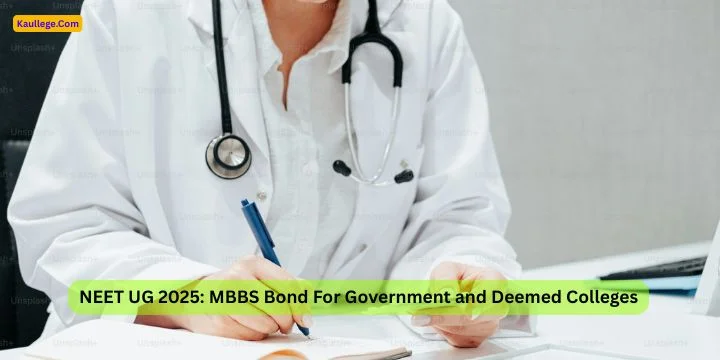MBBS Bond For Government and Deemed Colleges: In the NEET UG 2025 admissions cycle, numerous public medical institutions mandate that candidates sign a bond agreement upon enrolling in the MBBS program. This agreement typically stipulates that, upon graduation, students are required to serve in government-run or rural healthcare facilities for a designated duration. Failure to fulfill this service commitment may result in a monetary penalty. Additionally, certain states impose fines on students who discontinue the course prematurely and may demand a bank guarantee to ensure course completion. These regulations differ across various states. Conversely, deemed universities generally do not impose service bonds; instead, they require a commitment to pay the tuition fees.
Categories of MBBS Bonds for NEET UG 2025
- Service Commitment Bond: Post-MBBS, students are obligated to work as medical practitioners, typically in government hospitals, Primary Health Centers (PHCs), or Community Health Centers (CHCs), for a specified period. This requirement is predominantly enforced in public medical colleges. Opting out of this service may necessitate the payment of a predetermined bond amount to obtain the MBBS completion certificate.
2. Course Discontinuation Bond: Students who withdraw from the MBBS program before completion are subject to a financial penalty. This rule is applicable across all types of institutions, including public, private, deemed, and central medical colleges.
3. Bank Guarantee Requirement: In certain states, students must provide a bank guarantee at the time of admission. This guarantee, issued by a nationalized bank, ensures that students have a fixed deposit in line with bond regulations. If a student fails to complete the course or fulfill the service bond, the government can utilize this amount to recover the penalty.
4. Mandatory Rural Service Bond: Some states require students to serve in rural healthcare centers after completing their MBBS. This obligation particularly applies to those who have benefited from government scholarships or fee reimbursement programs, regardless of whether they studied in public or private institutions.
Are Service Bonds Required in Deemed Universities?
No, deemed universities typically require only a written assurance from parents or guardians confirming the payment of fees and completion of the course. They do not mandate post-MBBS government service.
Read Also: List of Government Medical Colleges Accepting Low NEET Scores in India 2025
State-Specific MBBS Bond Details in Government Medical Colleges
| States | Details |
| Andaman & Nicobar | Rs 10 lakh bond for 1 year service |
| Andhra Pradesh | Rs 50 lakh bond for 1 year service |
| Arunachal Pradesh | Rs 10 lakh bond for 3 year service |
| Assam | Rs 7 lakh bond for 5 year service |
| Chhattisgarh | Rs 25 lakh bond for 5 year service |
| Delhi | Rs 10 lakh bond for no year service |
| Goa | Rs 5 lakh bond guarantee for 1 year service; Rs 10 lakh discontinuation bond |
| Gujarat | Rs 20 lakh bond for 1 year service; Rs 5 lakh discontinuation bond; also applies to MYSY/ Kanya Kedavani Scheme Students |
| Haryana | Rs 25.55 lakh bond (Boys), Rs 23.19 lakh (Girls) for 5 years of service |
| Jharkhand | Rs 20 lakh penalty bond for leaving the course |
| Karnataka | 1 year compulsory government service after MBBS |
| Kerala | Rs 10 lakh bond for 2 years of service |
| Madhya Pradesh | Rs 10 lakh bond for 1 year service ( Rs 5 lakh for reserved categories); Rs 30 lakh penalty for leaving early |
| Maharashtra | Rs 10 lakh bond for 1 year service, Rs 10 lakh penalty for leaving early; rural service mandatory for scholarship holders |
| Rajasthan | Rs 5 lakh bond for 2 year of service |
| Tamil Nadu | Rs 5 lakh bond for 5 year service; Rs 10 lakh penalty for discontinuation |
| Telangana | Rs 30 lakh penalty for quitting the course |
| Uttar Pradesh | Rs 10 lakh bond for 2 years of service |
| West Bengal | Rs 10 lakh penalty for discontinuing the course |
Note: The above details are subject to change based on state policies and regulations.


Leave a Reply